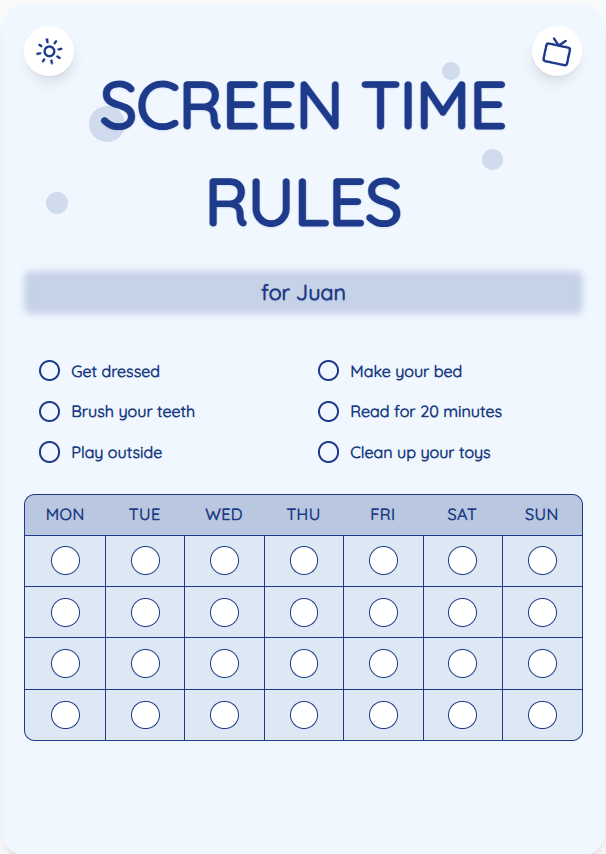Unlocking the Secrets of Japanese Screen Time Limits for Kids
As a parent, finding the right balance when it comes to screen time for your children can be challenging. In Japan, parents have established effective techniques to manage and limit screen time in a way that promotes healthy child development and family harmony. Let's explore these techniques and how you can implement them in your own home.
See What Your Screen Time Chart Will Look Like
Here's an example of a beautiful, customizable screen time rules chart you can create for your family

Understanding the Japanese Approach to Screen Time Management
In Japan, screen time limits are often set based on age-appropriate guidelines and the concept of 'moderation in all things.' Parents prioritize activities that promote physical movement, social interaction, and cognitive development over excessive screen time. By understanding the reasoning behind these limits, you can tailor them to suit your child's needs and interests.
Practical Tips for Implementing Screen Time Limits
1. Create a screen time chart using tools like ScreenTimeRules.com to visually establish daily limits. 2. Encourage outdoor play and hands-on activities as alternatives to screen time. 3. Set specific time blocks for screen usage, such as after homework or before bedtime. 4. Lead by example by modeling healthy screen habits for your children.
Put These Tips Into Action
Create a custom chart to implement these strategies with your child
Building Consistency and Flexibility in Screen Time Rules
Consistency is key when it comes to enforcing screen time limits. However, it's also important to be flexible and adjust the rules based on your child's behavior and needs. By regularly reviewing and adapting the limits, you can create a sustainable screen time routine that works for your family.
Practical Tips for Success
- Create a visual screen time chart for easy reference
- Encourage a balance of screen time with physical activities
- Establish clear rules and consequences for exceeding screen time limits
- Engage in open communication with your child about screen time usage
Frequently Asked Questions
What are the recommended screen time limits for different age groups?
While specific guidelines may vary, experts generally suggest limiting screen time to 1 hour per day for children aged 2-5 and up to 2 hours per day for children aged 6-12.
How can I motivate my child to adhere to screen time limits?
Incorporate positive reinforcement strategies such as rewards for following the rules, creating a screen-free zone in certain areas of the house, and involving your child in the decision-making process regarding screen time rules.
Is it okay for my child to use screens for educational purposes?
While educational content can be beneficial, it's essential to monitor the quality and quantity of screen time even when it's for educational purposes. Set clear boundaries and ensure that screen time supports, rather than substitutes for, other learning activities.
By embracing the Japanese-inspired approach to screen time management and incorporating practical tips into your daily routine, you can create a healthier digital environment for your child. Remember, setting boundaries around screen time is not just about restriction but also about fostering creativity, social skills, and overall well-being.
Ready to Transform Your Family's Screen Time?
Join thousands of parents who have successfully managed screen time with our customizable charts.
